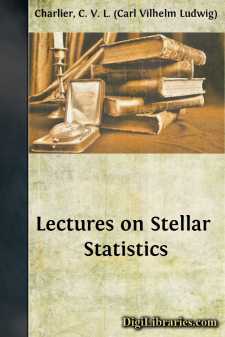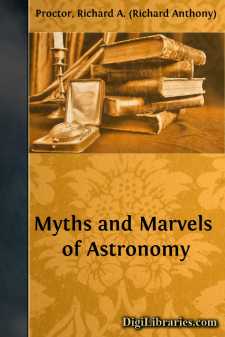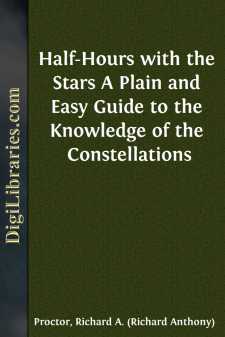Science
- Astronomy
- Biology 40
- Chemistry 13
- Electricity 1
- General 38
- History 6
- Light 1
- Paleontology 2
- Philosophy & Social Aspects 1
- Physics 3
- Relativity 2
- Study & Teaching 1
- Waves & Wave Mechanics 1
Astronomy Books
Sort by:
CHAPTER I. THE ASTRONOMICAL OBSERVATORY. Early Astronomical Observations—The Observatory of Tycho Brahe—The Pupil of the Eye—Vision of Faint Objects—The Telescope—The Object-Glass—Advantages of Large Telescopes—The Equatorial—The Observatory—The Power of a Telescope—Reflecting Telescopes—Lord Rosse's Great Reflector at Parsonstown—How the mighty Telescope is...
more...
CHAPTER I. APPARENT ATTRIBUTES OF THE STARS. 1. Our knowledge of the stars is based on their apparent attributes, obtained from the astronomical observations. The object of astronomy is to deduce herefrom the real or absolute attributes of the stars, which are their position in space, their movement, and their physical nature. The apparent attributes of the stars are studied by the aid of their...
more...
ASTROLOGY. Signs and planets, in aspects sextile, quartile, trine, conjoined, or opposite; houses of heaven, with their cusps, hours, and minutes; Almuten, Almochoden, Anahibazon, Catahibazon; a thousand terms of equal sound and significance.—Guy Mannering. ... Come and see! trust thine own eyes.A fearful sign stands in the house of life,An enemy: a fiend lurks close behindThe radiance of thy...
more...
CHAPTER I THE EARTH It is a curious fact that when we are used to things, we often do not notice them, and things which we do every day cease to attract our attention. We find an instance of this in the curious change that comes over objects the further they are removed from us. They grow smaller and smaller, so that at a distance a grown-up person looks no larger than a doll; and a short stick planted...
more...
CHAPTER I. EARLY OBSERVERS OF MARS. Few persons except astronomers fully realise that of all the planets of the Solar system the only one whose solid surface has been seen with certainty is Mars; and, very fortunately, that is also the only one which is sufficiently near to us for the physical features of the surface to be determined with any accuracy, even if we could see it in the other planets. Of...
more...
by:
Charles Fort
A procession of the damned. By the damned, I mean the excluded. We shall have a procession of data that Science has excluded. Battalions of the accursed, captained by pallid data that I have exhumed, will march. You'll read them—or they'll march. Some of them livid and some of them fiery and some of them rotten. Some of them are corpses, skeletons, mummies, twitching, tottering, animated by...
more...
INTRODUCTION We know, both by tradition and published records, that from the earliest times the faint grey and light spots which diversify the face of our satellite excited the wonder and stimulated the curiosity of mankind, giving rise to suppositions more or less crude and erroneous as to their actual nature and significance. It is true that Anaxagoras, five centuries before our era, and probably...
more...
It is very easy to gain a knowledge of the stars, if the learner sets to work in the proper manner. But he commonly meets with a difficulty at the outset of his task. He provides himself with a set of the ordinary star-maps, and then finds himself at a loss how to make use of them. Such maps tell him nothing of the position of the constellations on the sky. If he happen to recognize a constellation,...
more...









